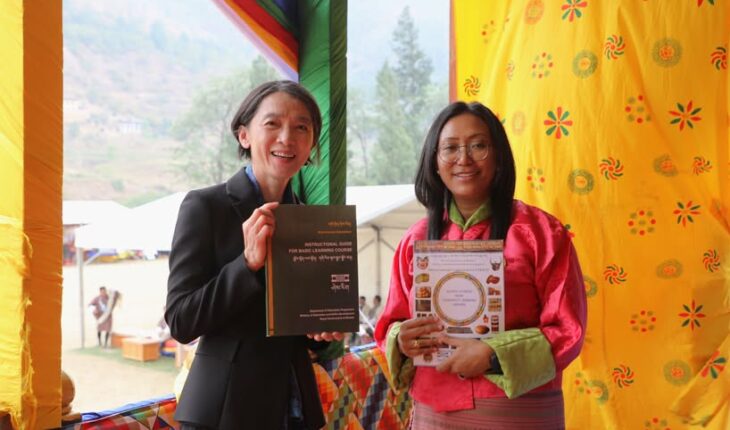
STAFF REPORTER
Thimphu
Two books on instructional guide for basic learning course and success stories from community learning centers were launched during the second National Community Learning Center Exhibition held in Punakha on April 8.
The stories reflect the resilience and determination of learners – youth and adults alike – who have overcome barriers to education and achieved personal and professional growth.
Some of the key themes emerging from these success stories include, skills for livelihoods, vocational training programs have enabled community members to gain employable skills and start sustainable income-generating activities.
The other is the community engagement as CLCs have strengthened local participation, fostering a culture of collective learning and development.
The other is the partnerships & sustainability with collaborative efforts between government agencies, NGOs, and local leaders have been instrumental in the success and scalability of CLC initiatives.
Through training in tailoring, embroidery, carpentry and other market-relevant trades, the programme has become a powerful engine for financial empowerment, particularly for women.
Some learners opened their own tailoring shop and they are thriving in the market. Some have commenced home-based business. By providing them with various vocational and lifelong skills, their livelihood has improved a lot.
This skill not only provided lifelong employment opportunities but also contributed to raising their living standards.
Success Stories from CLCs book captures the transformative impact of 29 CLCs across Bhutan, particularly in rural and underserved areas. It highlights how these centers have become key platforms bridging educational gaps, providing essential skills, and fostering livelihood opportunities and social empowerment.
One of the CLC learner Ms. Rinzin expressed that she started earning from her home-based business. “I am earning very well doing home based-business, without having to depend on others. It makes us proud and strong and I will continue to work on tailoring.
One of the learners, a single mother of five, has opened a tailoring shop in Thimphu. She is able to support her children’s education expenses on her own.
Many beneficiaries have transformed their lives by establishing small businesses, securing employment, or launching home-based enterprises – tangible proof of the programme’s socio- economic impact.
The learners at Jomotshangkha CLC are gaining valuable skills in tailoring and bakery, along the Dzongkha, English, environmental awareness and digital literacy. These diverse learning opportunities are equipping them with both practical skills and essential knowledge, helping to empower individuals and strengthen the community as a whole.
Several graduates have successfully utilized the skills acquired from the CLC to establish their own tailoring businesses, becoming entrepreneurs in their communities.
The center continues to empower individuals by fostering a spirit of entrepreneurship, self-reliance, and economic independence.
Ms. Sangay Wangmo, a CLC graduate, has opened a tailoring shop in Denchi town, PemaGatshel, where she currently employs two other women, providing them with stable income and skill enhancement opportunities.
Her business has gained recognition for quality craftsmanship and customer satisfaction, contributing to the local economy.
The Chuzagang Community Learning Centre in Sarpang Dzongkhag offers an Advanced Learning Course (ALC) to learners who have completed the Basic Literacy Course (BLC) and Post Literacy Course (PLC) from NFE Centres, as well as to youth and school dropouts.
The tailoring course at Trashi Yangtse CLC has empowered numerous learners to pursue entrepreneurial ventures and achieve financial independence.
Several graduates have established their own tailoring businesses, contributing to the local economy and their communities.
Rinchentse CLC in Drala under Chukkha Dzongkhag had successfully graduated a total of 42 learners. Among the graduates, 14 learners have started home businesses in tailoring, while 6 have ventured into baking. Moreover 3 learners are working in tailoring shop.
They are thankful to Ministry of Education and Skills Development for availing the opportunity to learn the skills at CLC.
The Mongar Community Learning Center (CLC) offers an Advanced Tailoring Course designed for learners who have completed the Basic and Post-Learning Courses at NFE Centers, as well as for youth and school
dropouts.
This hands-on program focuses 80 per cent on practical tailoring skills and 20% on literacy development, equipping participants with both vocational expertise and essential knowledge.
The course provides engaging, skill-building activities to help learners master sewing techniques while strengthening their educational foundation.
Dorokha CLC was established in the year 1st June 2021 under Dophuchen Gewog, Dorokha, Samtse with 13 females and with lone instructor as first batch and successfully completed in the following year.
The establishment was fully supported by different stakeholder. The center began with tailoring and now it has expanded to bakery too. In second batch there was 7 females and 1 male. Today there are 2 males and 7 females undergoing the course which end on October 2025.
There are many people who have started their business of their own after successfully completing their training. The second batch also formed group and opened a tailoring shop. In 2023 Dzongkhag Education Office tendered to stitch scout scarf for seven thousand students of the Dzongkhag.
Success Stories from CLCs book captures the transformative impact of 29 CLCs across Bhutan, particularly in rural and underserved areas. It highlights how these centers have become key platforms bridging educational gaps, providing essential skills, and fostering livelihood opportunities and social empowerment.
The Instructional Guide, the first of its kind will serve as a vital resource for instructors at non-formal education (NFE) centers across the country.
Designed in alignment with the NFE Curriculum Framework, the guide offers structured guidance, innovative teaching methodologies and practical strategies to effectively deliver the basic learning course while promoting the holistic development of learners.
The publication was funded by the Korean National Commission for UNESCO (KNCU) under the Bridge Bhutan Project.



